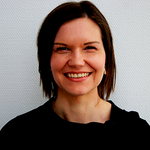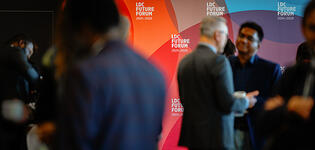Blog
From UNU-WIDER to the world
Journeys in development economics
‘What makes UNU-WIDER a unique place for researchers is the sense of community and the combination of academic rigour, policy relevance, and position within the UN system’ — Amelia Santos-Paulino, UNU-WIDER Alumni
‘UNU-WIDER always manages to bring together many perspectives from development research and create visibility for the researchers’ — Konstantin M. Wacker, UNU-WIDER Alumni
A dream realized
In 2004, a job announcement in The Economist caught the eye of Amelia’s husband. Despite holding a secure position at the University of Sussex, she applied, joining UNU-WIDER in 2005 and starting a tenure that lasted until 2010.

She describes this period as her most productive in terms of research and knowledge accumulation, enriched by the expertise of her colleagues and a close-knit community. ‘It was my best decision to join UNU-WIDER. All the colleagues had expertise on different areas, I learned a lot, and I had a great bond with them. We cooked together at home; we were like a family.’
Empowering women in economics
Reflecting on her career, Amelia identifies two significant phases: ‘My PhD research and publication of my job market paper in the Economic Journal, which were influential in my first academic appointment at IDS-Sussex. Later, my time at UNU-WIDER allowed me to develop skills and critical thinking that got me where I am today’.
‘After UNU-WIDER, I moved to the newly established Trade and Poverty Unit at UN Trade and Development (UNCTAD) as Lead Economist. Currently I am Chief of Investment Research at the Division for Investment and Enterprises.’
Amelia has a one-word message to young women envisioning a career in research or policy: ‘Education. That is key, it matters, and it gives you the edge. There are challenges along the way, and especially in the economics profession women are still underrepresented. But I see more women now taking up leadership positions in development economics and I hope it continues. At UNCTAD we now have the first female Secretary-General from Latin America, as an example for all of us’.
‘I have been given the opportunity to compete on an equal footing, but there is still some way to go to achieve equality at the UN.’
A WIDER way to transfer knowledge

During her time at UNU-WIDER, Amelia worked as a Research Fellow and Project Director. ‘Arriving in the start of the new work programme, I had the opportunity to shape the next cycle of projects. I led two projects: Southern engines of global growth and Fragility and development.’
‘In the Fragile states project we joined forces with UN DESA for the conference Fragile States - Fragile Groups. Tackling Economic and Social Vulnerability. One striking memory I have related to that collaboration is a project meeting in Fiji that took place almost on the eve of a coup d’etat: a first-hand fragility and development experience.’
‘The Southern Engines of Global Growth project featured notable research events in Brazil, China, South Africa, and India, bringing together leading scholars from Global South and North—a prominent feature of UNU-WIDER’s programmes. In addition to the academic publications, policy briefs were an important part of the process. I still use those briefs today to start some of the talks with policymakers.’
Amelia also takes pride in her involvement in working with UNU-WIDER’s Visiting PhD Fellows. ‘More than a simple internship, it was a true research collaboration. And, I am very proud that the doctoral students I supervised are now well established professionals in different fields of economics and development. I proudly record them in my CV. ‘
‘For example, I still maintain intellectual exchanges on international investment and development issues with Konstantin, who I supervised during his visit at UNU-WIDER. Despite living in Switzerland, I cannot keep up with his trekking and skiing though.’

The evolving landscape of foreign investment
Konstantin M. Wacker furthered his PhD thesis on foreign direct investment (FDI) and development at UNU-WIDER in 2011. UNU-WIDER’s international relevance and Amelia’s paella were among the things he most enjoyed during his 3-month internship: ‘My job market paper got a lot of visibility as a WIDER Working Paper, which it otherwise may not have gotten’.
His time at UNU-WIDER has also shaped his research agenda: ‘Through Amelia’s work on Southern engines of growth, I started to think more about FDI originating from the South. That triggered a paper on global FDI I published many years later’.
Konstantin is still doing research on FDI and enjoys the ambiguity of the topic: ‘FDI of multinational companies fosters many new technologies, but also leads to tax avoidance. Or think about the green transition: FDI brings green technologies. Yet, there are 31 countries in the Global South that are not attracting a single renewables project’.
The WIDER experience : a crucial step on the academic journey

For Konstantin, UNU-WIDER was a springboard into international organizations, leading to roles at the IMF, European Central Bank, and World Bank, before his current position as an Associate Professor at the University of Groningen.
‘My time at UNU-WIDER and subsequent roles in international organizations equipped me with the skills and knowledge necessary for a successful academic career.’
Amelia U. Santos-Paulino is Chief of the Investment Research Section at the UN Trade and Development (UNCTAD). Previously, she was a Research Fellow and Project Director at UNU-WIDER, and a Research Fellow at IDS-Sussex. She has also worked as a Senior Economist at the Central Bank of the Dominican Republic and as Senior Advisor in the US-DR-CAFTA negotiations.
Konstantin M. Wacker is an Associate Professor at the University of Groningen, Netherlands.
The views expressed in this piece are those of the author(s), and do not necessarily reflect the views of the Institute or the United Nations University, nor the programme/project donors.
 Join the network
Join the network









